Venezuela’s Crisis: The Start of a Dictatorship?
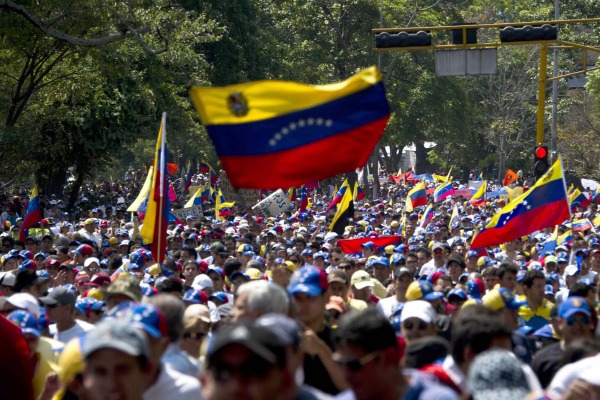 People attend a march during a protest against the government of President Nicolas Maduro in San Cristobal, capital of the western border state of Tachira, Venezuela, on February 22, 2014. Most of the stores were closed for fear of unrest in San Cristobal. The death toll from escalating anti-government protests in Venezuela jumped to eight on Friday, as President Nicolas Maduro's leftist administration threatened to cut off fuel to areas "under fascist siege." AFP PHOTO / LUIS ROBAYO
People attend a march during a protest against the government of President Nicolas Maduro in San Cristobal, capital of the western border state of Tachira, Venezuela, on February 22, 2014. Most of the stores were closed for fear of unrest in San Cristobal. The death toll from escalating anti-government protests in Venezuela jumped to eight on Friday, as President Nicolas Maduro's leftist administration threatened to cut off fuel to areas "under fascist siege." AFP PHOTO / LUIS ROBAYO
Protests, violence, and hunger seem to have taken over Venezuela. Ever since the death of former president Hugo Chavez, the country has struggled to resolve political conflicts and economic crises. Amidst falling oil prices, civilian unrest, and rising inflation, Venezuelan citizens question the steps president Nicolas Maduro has taken to solve these issues. The most recent of these matters was his desire to redraft the 1999 Constitution written under Chavez’ regime.
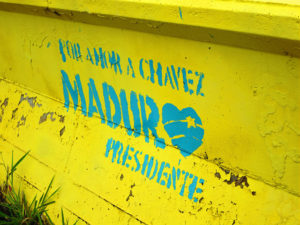
Venezuela has a long, storied history that has led to the problems it faces today. Politically, one can argue that the issue stems from the split between Chavistas and those who wanted to end the United Socialist Party’s (PSUV) long reign. Supporters of the party vouch for the success of their policies in lifting people out of poverty and redistributing resources. With the death of Hugo Chavez, Maduro, who was Vice President at the time, became his successor with the hopes that he would continue the successes of his predecessor. Those against the PSUV argue that there has been less democratic participation and the redistribution of resources is not necessarily the best thing to do to further the country’s economic growth. Both perspectives are constantly in conflict, and each has their own respective way of viewing the declining economic success of the country.
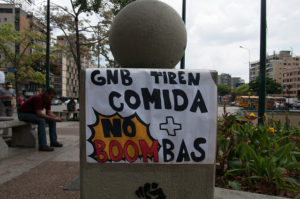
Venezuela is in economic trouble. Half of the country’s revenue is dependent on oil— it accounts for 95% of their export revenues. Under Chavez, the country was able to use profits from the government-owned oil companies to fund vital social welfare programs. However, the falling price of oil has greatly impacted the country and the programs that were reliant on this industry. Just in the past year, the average price of oil dropped from $52.39 per barrel to $43.73 per barrel, and it may continue on this downward trend. With a country so dependent on a single industry, the effects have been disastrous. Venezuela has experienced hyperinflation, with a shocking peak of 800% measured in December 2016. Citizens have struggled to buy household staples and food, and those who are sick are struggling to obtain medication due to shortages. With under $10 billion left in their foreign reserves, the government lacks the resources to alleviate the problem. Venezuelans have a just cause to be upset and angry, thus perpetuating the political problems of the country: protests and violence have broken out on the streets, people are struggling to eat, and some are even fleeing the country.
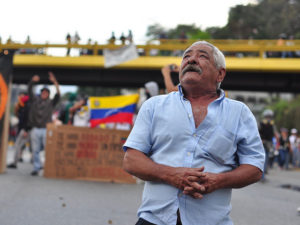
No matter what one’s political alignment is, Maduro’s recent actions warrant attention and analysis. The first sign of trouble was back in March when the Supreme Court transferred parliamentary powers to the judicial branch—essentially dissolving one of the three branches of the government. This gave one party, the PSUV, all the governing power within the state. Although the court reversed its ruling, the damage to the citizens’ trust has already been done. Protests and violence escalated due to the frustrations of the people regarding inflation and lack of immediate response by the government. However, last July 30th, Maduro called for a national vote to elect a constituent assembly in order to rewrite the 1999 Constitution under Chavez. Maduro defends his decision as a way to keep peace in the country as incidents of violence and civil unrest are soaring. The opposition has boycotted the election last Sunday in order to invalidate the voting, but it continued and put a new legislative body in power. A majority of the members of the National Constituent Assembly are pro-Maduro, and this marked the beginning of a one-party rule. Although there are allegations of falsified voting figures, it is doubtful that this will change anything if proven true.
Both anti-PSUV and Chavistas are condemning his decisions. In an attempt to gain more control, the government jailed opposition leader Leopoldo Lopez and politician Antonio Ledezma, while threatening to remove Luisa Ortega, the country’s general attorney, from her post due to her criticism of Maduro despite her Chavista loyalties; she accuses him of tarnishing Chavez’ legacy. While one can argue that the Maduro regime will be able to find solutions more quickly or efficiently with a one-party system, it is more likely that the country will become a dictatorship that will not solve the economic crisis. Even if Maduro can calm protests and establish peace domestically, his decision to create a new Constituent Assembly will not help the economically drowning Venezuela. The perception that a system with one opinion will get things done quicker in crisis resolution attempts is an illusion, and it is likely that this argument is used to justify the dictatorship.
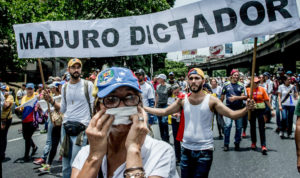
Other than the humanitarian aid of the United Nations, the international community has responded to the political tensions in Venezuela. Border tensions with Brazil and Colombia are rising due to the sudden influx of refugees. With the influx of Venezuelans, both countries’ governments are skeptical they can support these refugees along with their own citizens. The Organization of American States (OAS) has attempted to diplomatically pressure Maduro into holding fair elections, as part of their agreement was “to promote and consolidate representative democracy, with due respect for the principle of nonintervention.” If Maduro’s actions are seen as a threat to the peace of the OAS, then member-states have the incentive to pressure his decisions. President Trump has threatened to sanction Venezuela as a consequence of their reversal of representative, democratic ideals. Allegedly, they are also considering imposing an oil embargo. However, the actions of the international community need to be carefully calculated from here, as economic sanctions and embargoes could harm Venezuela more. Already so reliant on oil, restricting the industry could make it even more difficult for Venezuelans to obtain food, medicine, and household staples. It is difficult to find a proper response to Venezuela, as the international community cannot leave its people to suffer, but at the same time, those who uphold democratic ideals also cannot let Maduro’s regime continue without consequence.

The crisis in Venezuela highlights the importance of an opposition and the distribution of powers. With a large population and a democratic government, it is important to have varying opinions and beliefs represented within the government in order to reach compromises that will more likely benefit the most number of people. Even if most people approve of the current government, an opposition allows one to see flaws and details that have been missed, and this is crucial. The separation of powers is important to keep the government in check, and this gives the citizens a sense of security that absolute power is not in the hands of a single person or party. Without this, corruption may become rampant and ingrained in the government—leading the population to suffer the consequences. While one can argue that a democratic regime is not for every county, power held by a single person or party with a low approval and high mistrust from the people is simply not acceptable. Venezuela might soon become a dictatorship, and the international community has to find effective ways to address this.
